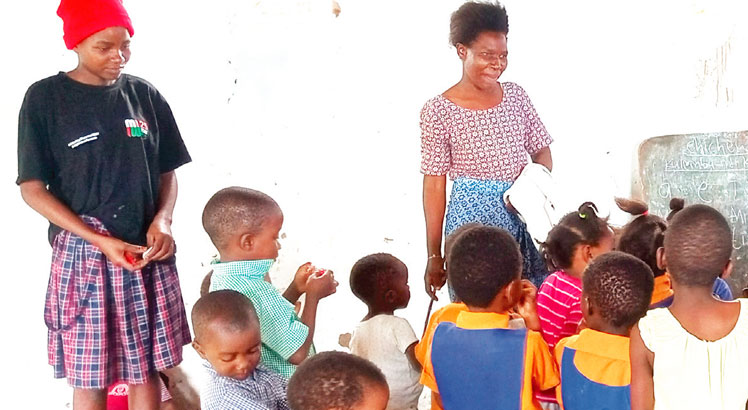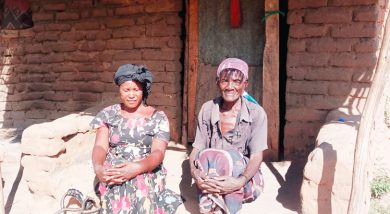Children play to heal post-disaster trauma
At the foot of Soche Hill in Blantyre, the sounds of children at play welcome visitors to Kwacha Vision People’s Care.
The community-based childcare centre (CBCC) near Naotcha Market in Chilobwe Township has 10 children with untold stories of the devastation caused by Cyclone Freddy in March 2023.
As they sing, dance and play, five-year-old Faith sits in solitude, gazing at a doll as her mind wanders away from the hullabaloo.
The girl and her mother saw their house collapse when the world’s longest-lasting cyclone triggered landslides in the hilly settlement.
“Our house is gone,” says the girl renamed Faith, gripping her toy, “The house we live in now isn’t ours.”

She is among hundreds of children hit by Cyclone Freddy.
According to the Department of Disaster Management Affairs (Dodma), the cyclone affected more than 2.2 million people and displaced 679 278 across southern Malawi.
It killed 679 killed and 530 are still missing, Dodma reports.
The toll includes 300 battered households and at least 100 deaths on the slopes of Soche Hill where children still grapple with the psychological aftershocks.
“Nearly everyone in this community is affected,” says village head Chilobwe. “A year on, the survivors, particularly women and children, still feel the loss, confusion and deteriorating living conditions.”
The post-disaster shock prompted St John of God Hospitaller Services to intervene.
“We are looking at a highly traumatised community,” says the institution’s programmes manager Christopher Mhone. “Since last year, we have trained counsellors to assist people with psychosocial challenges.”
The mental health workers target clients of all ages.
However, Mhone says the neglected mental needs of children are “more pressing”.
“Tossed from their homes to highly congested camps and now staying with strangers, these children had to grapple with a world they had lost, friends and caregivers they couldn’t see anymore and cherished homes they couldn’t return to,” he states.
The trauma caused by disasters made more frequent and devastating by climate change affects the young survivors’ early childhood development.
“If not properly managed, this can be particularly difficult for their development processes,” says Mhone.
Kwacha Vision People’s Care director Bishop Clara Kamanga wrestles with the enormity of the needs of children affected by the cyclone. There are 10.
Having lost nearly everything, their parents struggle to provide basic needs.
“These learners often come to school hungry and we have to feed them before they go to class,” she says gazing at cyclone-battered structures that still house the beginners.
The bishop of Mercy Seed Church says the nine-year-old CBCC, which initially had over 150 children, now enrols less than 50 due to food woes.
“We are currently rationing the food to accommodate the children in dire need,” says Kamanga.
The cleric keeps a family rendered homeless by the cyclone.
She wishes the survivors, especially women, were economically empowered to venture into a profitable business for their mental well-being.
“Faith is an intelligent girl, but spends most of the time in isolation. At times, she says: ‘Today, I won’t write because I am hungry,’” Kamanga narrates.
Faith’s mother survives on piecework.
She is living with her friend.
A man promised her marriage and assistance but bolted after impregnating her.
Blantyre district assistant social welfare officer Samuel Chitseko says lack of food and shelter compound mental trauma.
As aid for cyclone survivors wanes, the social welfare office encourages community members to find solutions to save children from hunger, malnutrition and skipping classes or dropping out.
Chitseko says the psychological damage among children can affect brain development, mental health and overall well-being.
“Children, aged six to 18, who have experienced crisis events are particularly prone to psychological conditions,” he says.
The Department of Child Affairs and humanitarian organisations use play-based interactive sessions in child corners to help the vulnerable age group understand the changing situation, develop self-awareness and build resilience.
However, CBCCs assist children below six.
“You don’t counsel three to five-year-olds,” he says “They heal through playing and learning materials.”
The Malawi 2063 makes it a priority for every child to go through early childhood development (ECD) education.
Blantyre district has 1 150 CBCCs, but most of them lack skilled caregivers and toys.
In March, St John of God donated toys, exercise books, colouring books, mats, pens, study books, blocks, number and alphabet charts and crayons to three CBCCs in Blantyre and three others in Mulanje.
The donation targets over 800 CBCC learners in the two districts while sensitising communities to child rights and the dangers of child abuse.
“We are supporting the affected CBCCs so that children can feel motivated to go to school. If the kindergartens have nothing, children will not be motivated,” says Mhone.
Mhone says managing children’s psychological burdens involves a lot more than just learning and playing.
“Through these toys, we want to stimulate children’s brains to develop fine motor skills that would promote physical, emotional, social and cognitive development,” he says “The materials also help caregivers to monitor traumatic children.”
Caregiver Ruth David says looking at the way interact with peers and materials, trained care providers can track progress in the healing process.
“We observe children’s behaviour, such as isolation from peers, punctuality, how active they are, refusing to answer questions and absenteeism to assess their healing process,” she says





